Résultats de recherche de titre
Articles 1 à 20 sur 21256
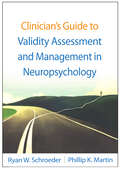
Clinician's Guide to Validity Assessment and Management in Neuropsychology (Evidence-Based Practice in Neuropsychology Series)
Par Ryan W. Schroeder, Phillip K. Martin. 2025
This unique hands-on guide walks neuropsychologists through the process of validity assessment and management in real-world clinical settings. Emphasizing the…
medical necessity of evaluating validity, the authors provide detailed examples, procedural tips, and downloadable practical tools. Step-by-step guidelines are presented for managing potentially complicated referrals, using the clinical interview to gain awareness of possible concerns, choosing and administering performance and symptom validity tests, and providing feedback and treatment recommendations when invalidity is identified. Clinician–patient relationship issues are sensitively addressed. The book concludes with a chapter-length case example.
Gamboa's World: Justice, Silver Mining, and Imperial Reform in New Spain (Diálogos Series)
Par Christopher Albi. 2021
Gamboa&’s World examines the changing legal landscape of eighteenth-century Mexico through the lens of the jurist Francisco Xavier de Gamboa…
(1717–1794). Gamboa was both a representative of legal professionals in the Spanish world and a central protagonist in major legal controversies in Mexico. Of Basque descent, Gamboa rose from an impoverished childhood in Guadalajara to the top of the judicial hierarchy in New Spain. He practiced law in Mexico City in the 1740s, represented Mexican merchants in Madrid in the late 1750s, published an authoritative commentary on mining law in 1761, and served for three decades as an Audiencia magistrate. In 1788 he became the first locally born regent, or chief justice, of the High Court of New Spain. In this important work, Christopher Albi shows how Gamboa&’s forgotten career path illuminates the evolution of colonial legal culture and how his arguments about law and justice remain relevant today as Mexico debates how to strengthen the rule of law.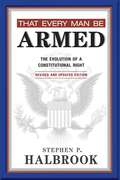
That Every Man Be Armed: The Evolution of a Constitutional Right. Revised and Updated Edition.
Par Stephen P. Halbrook. 2013
That Every Man Be Armed, the first scholarly book on the Second Amendment to the U.S. Constitution, has played a…
significant role in constitutional debate and litigation since it was first published in 1984. Halbrook traces the right to bear arms from ancient Greece and Rome to the English republicans, then to the American Revolution and Constitution, through the Reconstruction period extending the right to African Americans, and onward to today&’s controversies. With reviews of recent literature and court decisions, this new edition ensures that Halbrook&’s study remains the most comprehensive general work on the right to keep and bear arms.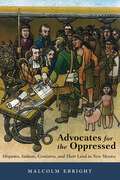
Advocates for the Oppressed: Hispanos, Indians, Genízaros, and Their Land in New Mexico
Par Malcolm Ebright. 2014
Struggles over land and water have determined much of New Mexico&’s long history. The outcome of such disputes, especially in…
colonial times, often depended on which party had a strong advocate to argue a case before a local tribunal or on appeal. This book is partly about the advocates who represented the parties to these disputes, but it is most of all about the Hispanos, Indians, and Genízaros (Hispanicized nomadic Indians) themselves and the land they lived on and fought for.Having written about Hispano land grants and Pueblo Indian grants separately, Malcolm Ebright now brings these narratives together for the first time, reconnecting them and resurrecting lost histories. He emphasizes the success that advocates for Indians, Genízaros, and Hispanos have had in achieving justice for marginalized people through the return of lost lands and by reestablishing the right to use those lands for traditional purposes.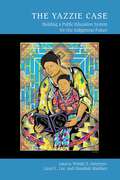
The Yazzie Case: Building a Public Education System for Our Indigenous Future (Studies in Indigenous Community Building)
Par Wendy S. Greyeyes, Lloyd L. Lee, and Glenabah Martinez. 2023
The story of Wilhelmina Yazzie and her son’s effort to seek an adequate education in New Mexico schools revealed an…
educational system with poor policy implementation, inadequate funding, and piecemeal educational reform. The 2018 decision in the Yazzie/Martinez lawsuit proved what has always been known: the educational needs of Native American students were not being met.In this superb collection of essays, the contributors cover the background and significance of the lawsuit and its impact on racial and social politics. The Yazzie Case provides essential reading for educators, policy analysts, attorneys, professors, and students to understand the historically entrenched racism and colonial barriers impacting all Native American students in New Mexico’s public schools. It constructs a new vision and calls for transformational change to resolve the systemic challenges plaguing Native American students in New Mexico’s public education system.ContributorsGeorgina BadoniCynthia BenallyRebecca Blum MartínezNathaniel CharleyMelvatha R. CheeShiv DesaiDonna DeyhleTerri FlowerdayWendy S. GreyeyesAlex KinsellaLloyd L. LeeTiffany S. LeeNancy LópezHondo Louis (photographer)Glenabah MartinezNatalie MartinezJonathan NezCarlotta Penny BirdPreston SanchezKaren C. Sanchez-GriegoChristine SimsLeola Tsinnajinnie PaquinVincent WeritoWilhelmina Yazzie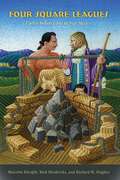
Four Square Leagues: Pueblo Indian Land in New Mexico
Par Rick Hendricks, Malcolm Ebright, Hughes W. Richard. 2014
This long-awaited book is the most detailed and up-to-date account of the complex history of Pueblo Indian land in New…
Mexico, beginning in the late seventeenth century and continuing to the present day. The authors have scoured documents and legal decisions to trace the rise of the mysterious Pueblo League between 1700 and 1821 as the basis of Pueblo land under Spanish rule. They have also provided a detailed analysis of Pueblo lands after 1821 to determine how the Pueblos and their non-Indian neighbors reacted to the change from Spanish to Mexican and then to U.S. sovereignty. Characterized by success stories of protection of Pueblo land as well as by centuries of encroachment by non-American Indians on Pueblo lands and resources, this is a uniquely New Mexican history that also reflects issues of indigenous land tenure that vex contested territories all over the world.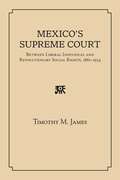
Mexico's Supreme Court: Between Liberal Individual and Revolutionary Social Rights, 1867-1934
Par Timothy M. James. 2013
Although Mexico&’s Constitution of 1917 mandated the division of large landholdings, provided land for the landless, and guaranteed workers the…
rights to organize, strike, and bargain collectively, it also guaranteed fundamental liberal rights to property and due process that enabled property owners and employers to resist the implementation of the new social rights by filing suit in federal court. Taking as its main focus the way new and old rights were adjudicated before the Supreme Court, this book is the first to examine the subject through the lens of court documents and the writings and commentaries of jurists and other legal professionals. The author asks and answers the question, how did the judicial interpretation of the Constitution of 1917 become a barrier to implementing agrarian land rights and labor legislation in the years immediately following Mexico&’s social revolution of 1910?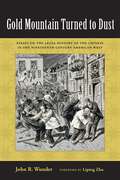
Some half million Chinese immigrants settled in the American West in the nineteenth century. In spite of their vital contributions…
to the economy in gold mining, railroad construction, the founding of small businesses, and land reclamation, the Chinese were targets of systematic political discrimination and widespread violence. This legal history of the Chinese experience in the American West, based on the author&’s lifetime of research in legal sources all over the West—from California to Montana to New Mexico—serves as a basic account of the legal treatment of Chinese immigrants in the West.The first two essays deal with anti-Chinese racial violence and judicial discrimination. The remainder of the book examines legal precedents and judicial doctrines derived from Chinese cases in specific western states. The Chinese, Wunder shows, used the American legal system to protect their rights and test a variety of legal doctrines, making vital contributions to the legal history of the American West.
How America Got Its Guns: A History of the Gun Violence Crisis
Par William Briggs. 2017
In the United States more than thirty thousand deaths each year can be attributed to firearms. This book on the…
history of guns in America examines the Second Amendment and the laws and court cases it has spawned. The author&’s thorough and objective account shows the complexities of the issue, which are so often reduced to bumper-sticker slogans, and suggests ways in which gun violence in this country can be reduced.Briggs profiles not only protagonists in the national gun debate but also ordinary people, showing the ways guns have become part of the lives of many Americans. Among them are gays and lesbians, women, competitive trapshooters, people in the gun-rights and gun-control trenches, the NRA&’s first female president, and the most successful gunsmith in American history.Balanced and painstakingly unbiased, Briggs&’s account provides the background needed to follow gun politics in America and to understand the gun culture in which we are likely to live for the foreseeable future.
The Future of Indian and Federal Reserved Water Rights: The Winters Centennial
Par Barbara Cosens, Judith V. Royster. 2012
On January 6, 1908, the Supreme Court ruled that when land is set aside for the use of Indian tribes,…
that reservation of land includes reserved water rights. The Winters Doctrine, as it has come to be known, is now a fundamental principle of both federal Indian law and water law and has expanded beyond Indian reservations to include all federal reservations of land. Ordinarily, there would not be much to say about a one hundred-year-old Supreme Court case. But while its central conclusion that a claim to water was reserved when the land was reserved for Indians represents a commitment to justice, the exact nature of that commitment-its legal basis, scope, implications for non-Indian water rights holders, the purposes for and quantities of water reserved, the geographic nexus between the land and the water reserved, and many other details of practical consequence-has been, and continues to be, litigated and negotiated. In this detailed collection of essays, lawyers, historians, and tribal leaders explore the nuances of these issues and legacies.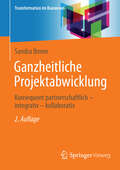
Ganzheitliche Projektabwicklung ist eine grundlegend neue Philosophie und Herangehensweise wie Baurojekte jeder Größenordnung menschlich und daher auch wirtschaftlich erfolgreich abgewickelt…
werden können. Dabei wird aktuelles Management-, Führungs- sowie Kommunikationswissen zusammengeführt und durch radikal vereinfachte und kooperationsfreundliche Vertragsgestaltungen und Ausschreibungen rechtlich gestützt. Sie ist die Grundlage einer neuen Kultur in der Projektabwicklung. Durch den umfassenden mediativen Ansatz wird der notwendige Transformationsprozess ermöglicht, weg von dem bisherigen Gegeneinander und hin zu einer für alle Beteiligten und Betroffenen gewinnbringenden Zusammenarbeit. So macht Arbeiten in Bauprojekten wieder Spaß und ermöglicht nachhaltige Wertschöpfung im und durch das Projekt
Justice Outsourced: The Therapeutic Jurisprudence Implications of Judicial Decision-Making by Nonjudicial Officers
Par Kelly Frailing, Michael L. Perlin. 2022
Nonjudicial officers (NJOs) permeate the criminal justice and the forensic mental health systems in hidden ways. But what are the…
impact and consequences of non-lawyers and non- “real judges” hearing cases? Across the nation, numerous cases are outsourced to administrative and other NJOs to decide issues ranging from family court cases involving custody disputes and foster care, to alcohol, substance abuse, as well as mental health and institutionalization issues. Moreover, NJOs may also deal with probation sentencing, conditions of confinement, release restrictions, and even capital punishment. The editors and contributors to the indispensable Justice Outsourced examine the hidden role of these non-judicial officers in the courtroom and administrative settings, as well as the ethical and practical considerations of using NJOs. Written from the perspective of therapeutic jurisprudence by judges, criminologists, lawyers, law professors, psychologists, and sociologists, this volume provides a much-needed wake-up call that emphasizes why the removal of a judge weakens a defendant’s rights and dignity and corrupts the administration of justice. However, Justice Outsourced also suggests effective employments of NJOs, revealing the potential of therapeutic principles and procedures to enhance the practical knowledge supplied by nonjudicial decision-makers.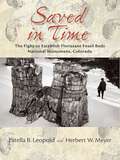
Saved in Time: The Fight to Establish Florissant Fossil Beds National Monument, Colorado
Par Estella B. Leopold, Herbert W. Meyer. 2012
In the summer of 1969, a federal district court in Denver, Colorado, heard arguments in one of the nation&’s first…
explicitly environmental cases, in which the Defenders of Florissant, Inc. opposed real estate interests intent on developing lands containing an extraordinary set of ancient fossils. This book, the first account of the fight to preserve the Florissant fossil beds, tells a story of environmental activism that remains little known more than forty years after the coalition&’s victory. The principal author, Estella Leopold, was a major participant in the process.
The Green Burial Guidebook: Everything You Need to Plan an Affordable, Environmentally Friendly Burial
Par Elizabeth Fournier. 2018
Funeral expenses in the United States average more than $10,000. And every year conventional funerals bury millions of tons of…
wood, concrete, and metals, as well as millions of gallons of carcinogenic embalming fluid. There is a better way, and Elizabeth Fournier, affectionately dubbed the &“Green Reaper,&” walks you through it, step-by-step. She provides comprehensive and compassionate guidance, covering everything from green burial planning and home funeral basics to legal guidelines and outside-the-box options, such as burials at sea. Fournier points the way to green burial practices that consider both the environmental well-being of the planet and the economic well-being of loved ones.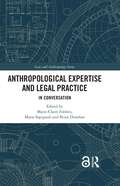
Anthropological Expertise and Legal Practice: In Conversation (Law and Anthropology)
Par Marie-Claire Foblets, Maria Sapignoli and Brian Donahoe. 2024
This book draws on concrete cases of collaboration between anthropologists and legal practitioners to critically assess the use of anthropological…
expertise in a variety of legal contexts from the point of view of the anthropologist as well as of the decision-maker or legal practitioner. The contributions, several of which are co-authored by anthropologist–legal practitioner tandems, deal with the roles of and relationships between anthropologists and legal professionals, which are often collaborative, interdisciplinary, and complementary. Such interactions go far beyond courts and litigation into areas of law that might be called ‘social justice activism’. They also entail close collaboration with the people –often subjects of violence and dispossession –with whom the anthropologists and legal practitioners are working. The aim of this collection is to draw on past experiences to come up with practical methodological suggestions for facilitating this interaction and collaboration and for enhancing the efficacy of the use of anthropological expertise in legal contexts. Explicitly designed to bridge the gap between theory and practice, and between scholarship and practical application, the book will appeal to scholars and researchers engaged in anthropology, legal anthropology, socio-legal studies, and asylum and migration law. It will also be of interest to legal practitioners and applied social scientists, who can glean valuable lessons regarding the challenges and rewards of genuine collaboration between legal practitioners and social scientists.
Charles Sumner: Conscience of a Nation
Par Zaakir Tameez. 2025
"A thorough recounting of the great legislator’s life and deed... unlikely to be bettered anytime soon... Tameez is expert at…
explaining Sumner’s legal thought... One cannot help wishing we had a Charles Sumner in Washington today."—The New York Times"An excellent book about the courageous Massachusetts senator... Drawing from hundreds of letters, articles and speeches, Mr. Tameez has created a remarkable portrait of a complex man who faced many personal challenges... Charles Sumner is a moving portrayal of a courageous, long-overlooked American who, in the words of one contemporary, 'stood in the vanguard of Freedom.'”—Wall Street JournalA landmark biography of Charles Sumner, the unsung hero of the American Civil War and ReconstructionCharles Sumner is mainly known as the abolitionist statesman who suffered a brutal caning on the Senate floor by the proslavery congressman Preston Brooks in 1856. This violent episode has obscured Sumner’s status as the most passionate champion of equal rights and multiracial democracy of his time. A friend of Alexis de Tocqueville, an ally of Frederick Douglass, and an adviser to Abraham Lincoln, Sumner helped the Union win the Civil War and ordain the Emancipation Proclamation, the Thirteenth Amendment, the Freedmen’s Bureau, and the Civil Rights Act of 1875. In a comprehensive but fast-paced narrative, Zaakir Tameez presents Sumner as one of America’s forgotten founding fathers, a constitutional visionary who helped to rewrite the post–Civil War Constitution and give birth to modern civil rights law. He argues that Sumner was a gay man who battled with love and heartbreak at a time when homosexuality wasn’t well understood or accepted. And he explores Sumner’s critical partnerships with the nation’s first generation of Black lawyers and civil rights leaders, whose legal contributions to Reconstruction have been overlooked for far too long.An extraordinary achievement of historical and constitutional scholarship, Charles Sumner brings back to life one of America’s most inspiring statesmen, whose formidable ideas remain relevant to a nation still divided over questions of race, democracy, and constitutional law.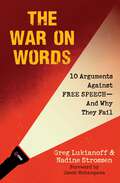
The War On Words: 10 Arguments Against Free Speech—And Why They Fail
Par Nadine Strossen, Greg Lukianoff. 2025
Heresy Press&’s first non-fiction offering addresses free speech and creative freedom—central to the press&’s mission—in the form of a concise…
primer of arguments against censorship. Co-authored by Greg Lukianoff and Nadine Strossen, The War on Words: 10 Arguments Against Free Speech—And Why They Fail constitutes a bulwark against attempts from both the political left and right to limit individual expression. At a time when pressures to conform threaten the exercise of viewpoint diversity and when attacks on free speech in word, print, performance, and image are a daily occurrence, we sorely need a book such as this! This handy volume is organized around 10 flawed assertions that are often invoked to limit the freedom of speech, followed by well-reasoned rebuttals of those arguments by both authors. A comprehensive introduction, updates to highlight current issues, and an appendix with helpful resources round off this volume. The writing is lively, clear, and persuasive.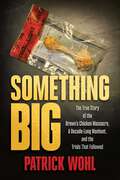
Something Big tells the story of the infamous Brown&’s Chicken massacre, a brutal case that captivated Chicagoland after remaining unsolved…
for nearly a decade.Customers know Brown's Chicken for its crispy buttermilk fried chicken and flaky biscuits. The Illinois-based franchise has a reputation for delicious but simple comfort food. But through no fault of its own, the words "Brown's Chicken" are also synonymous with one fateful night in January of 1993. &“A Real Hometown&” is the trite but apt motto of Palatine, Illinois, a quaint middle-class suburb west of Chicago. On a snowy Friday evening, the staff and owners of the city&’s local Brown&’s Chicken franchise were closing up when two final customers arrived just past 9 p.m. As the night drew on and the employees hadn&’t returned home, the families of the owners and workers began to worry, prompting police to investigate. When they entered the dark building, police were shocked to find seven bodies stacked in the restaurant&’s freezer and fridge. The killers, of course, were long gone. In the months that followed, the horrendous story rocked Chicagoland and the case remained unsolved for nine years. The Brown&’s Chicken massacre is one of the most infamous cases in Illinois history, yet it is often misremembered. In Something Big, Patrick Wohl gives a new account of the story, taking readers behind the scenes and sharing the perspective of the people who lived it.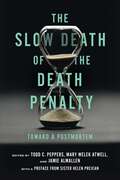
The Slow Death of the Death Penalty: Toward a Postmortem
Par Todd C. Peppers, Mary Welek Atwell, Jamie Almallen. 2025
Why the death penalty is in decline across the United StatesAcross the country, the death penalty is dying. Twenty-two states…
have abandoned state-sanctioned executions, including nine in the last fifteen years. Of the twenty-eight states that still have the death penalty, eight have not had an execution in over a decade. And public support for the death penalty has declined from 80% of the surveyed population in the early 1990s to approximately 50% today.As the death penalty slowly withers away, Todd C. Peppers, Jamie Almallen, and Mary Welek Atwell bring together a number of distinguished death-penalty scholars, activists, and attorneys to take an accounting of the damage inflicted by the machinery of death. Contributors to the book point to a range of different pathologies which have caused politicians and voters to turn against capital punishment, from unacceptable rates of false convictions and racially motivated prosecutions, to a clemency process poisoned by political factors.Essay topics include various dimensions of the death penalty, including racial and gender bias; economic costs; the conviction of juveniles, the mentally ill, and the factually innocent; Supreme Court decisions; and the failure of the death penalty to serve as a deterrent against crime. This important volume is an up-to-date accounting of the current state and, as the contributors argue, the future demise of the death penalty.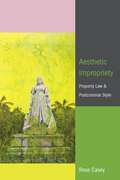
Aesthetic Impropriety: Property Law and Postcolonial Style
Par Rose Casey. 2025
Across Africa, Asia, and the Americas, colonial Britain’s property laws are in the process of being transformed. Aesthetic Impropriety analyzes…
vanguard legal actions and literary innovations to reveal contemporary reforms to property law that are undoing law’s colonial legacies. Casey traces precise legal histories across distinct jurisdictions throughout the anglophone world, revealing the connection between land law and petroleum extraction in the Niger Delta, inheritance and divorce laws and gender inequality in India, intellectual property law and Indigenous dispossession in South Africa, and admiralty law and racialized non-personhood in the English Atlantic. In response to these manifold forms of dispossession, significant reforms are underway, including through common law suits, statutory reform, and proposed changes to legal doctrine. Casey develops the concept of aesthetic impropriety to identify shared structures of thought across legal and literary venues. She shows that writers of poetry and prose are also transforming harmful property laws: in Nigeria, Ben Okri and Chigozie Obioma have articulated symbiotic ecological relationships that are also evidenced in recent actions against petroleum companies; in India, Arundhati Roy’s challenge to divorce laws has preempted similar attempts at reform in Parliament; in South Africa, Zoë Wicomb theorized protections for Indigenous modes of creative production nineteen years before they were signed into law; and in the Americas, M. NourbeSe Philip has proposed a novel method of achieving justice for the one hundred fifty enslaved people who were killed in the 1781 Zong massacre. Aesthetic Impropriety makes a convincing case for literature’s generative capacities and registers the enduring significance of the postcolonial as a necessary framework for understanding globalized inequality in the twenty-first century. By analyzing shared legal and aesthetic transformations, Aesthetic Impropriety argues that law and literature play vital roles in creating anticolonial world orders.